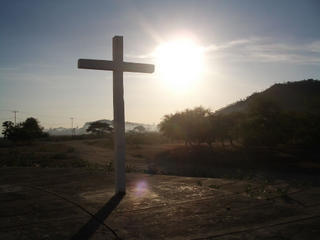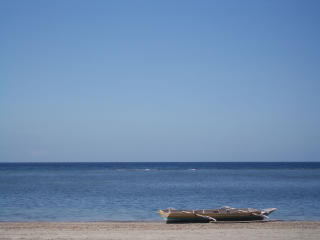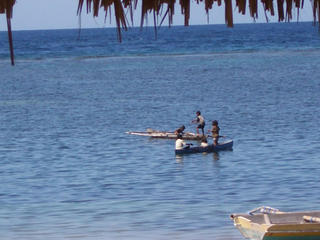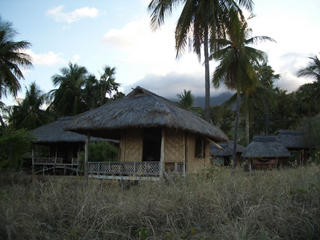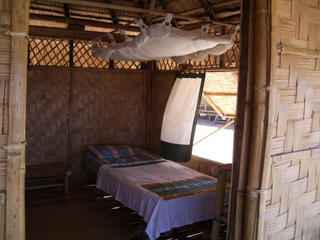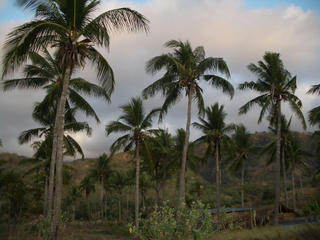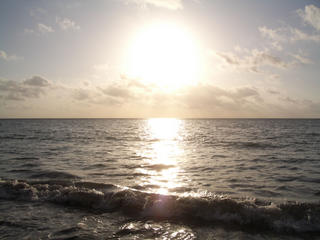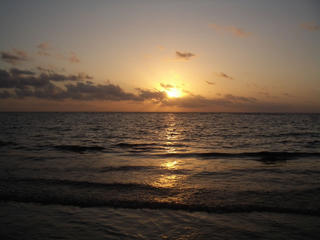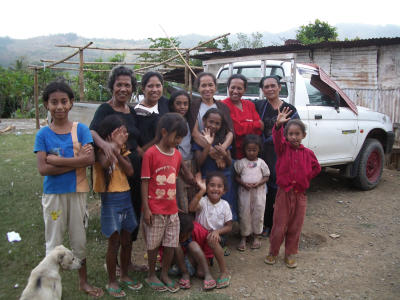Tuesday 26 July 2005
Last night we met a friend of a friend from Australia for dinner in town. I told her about my sleep deprivation and she offered me some of her sleeping tablets. I took one tablet last night and it worked: I finally slept from 10:30pm to 6:30am. However, Daniel is concerned that I will become addicted. Perhaps it is worth the risk as sleep deprivation is really reducing my capacity to function normally.
It does not feel right to have a woman (Senyora Domingas) clean and tidy our house, hand wash and iron our clothes. It feels very colonial and exploitative and makes me uncomfortable. But here when you rent, the landlady’s services are included in the cost of renting. In response, we have become tidier and I have been cleaning things thoroughly so that Domingas does not have to do so. However, it is disconcerting to arrive home every day to a very clean and tidy house, and Domingas does such a good job that we often cannot find things. We even acquired a plastic fish, which was put on our bookcase in front of our slowly growing collection of books. Daniel in particular finds it confronting, as he likes his privacy. He has even taken to locking our wardrobe, which I find infuriating, as I can never get in to it when I want to! I can also see why couples with household help, are spared the unceasing arguments about household chores that can really wear down a relationship.
We have small little geckos scurrying about inside and outside our home. They’re about 10cm in length and harmless to humans but apparently keep our house insect free.
At 7am this morning we went for a half-hour walk along the beach before getting ready for work. It was lovely and cool. I’m very glad that we live so close to the beach, as walking along it is a relaxing way to start the day. However, I said to Daniel that we are being spoiled for when we return to Australia, we simply couldn’t afford a beachside residence there.
While walking up our street this morning to catch a taxi from the main road, we passed many little children who either stared at us or exclaimed “malae, malae”. This is often accompanied by much excitement; one mother has taken to calling her children when she sees us coming! They were all very cute and adorable. It is hard not to feel like royalty, as if we are on procession for our subjects. The status accorded to us white fellas is hard to deal with.
We’re both thinking of getting our hair shaved to a number 2 or 3. The water pressure in the shower at home is woeful, not to mention the water is hard and difficult to work up a lather with, and given we both have very thick hair, we’re not sure how we’re ever going to wash it! Hair just seems another luxury we can both do without. However, we’re also not sure how the Timorese will deal with a shaven haired woman as most of the women have long hair!
I’ve had an on/off again headache for the last couple of days and I’m not sure if it’s malaria or the fact that because I’ve always got my hair up, it results in me having a headache. I will feel a bit silly if I go to the hospital for a blood test (by pricking a finger) and it turns out to be nothing more than my hair pulling too tight on my head! It’s also difficult to tell when a mosquito has bitten you. I have had a number of bites around my ankles (they love it down there), but they’re just red bumps without the white hard centres that I am used to in Australia. I wonder: am I being bitten by mossies or something else? One of Daniel’s Australian colleagues has been diagnosed with dengue fever. It’s a worry. We feel it is inevitable that we’ll both get it and/or malaria in due course. It is very difficult to completely avoid all mosquito bites. I cannot imagine continuing to slather mosquito repellent on myself 2-3 times a day for two years. Apart from the fact that the stuff is poisonous and rubbing it into your skin is not good for your body, it’s a hassle to be so diligent. The Timorese certainly do no such thing and have to live their entire lives with the risk of contracting mosquito borne diseases (in addition to everything else).
This morning our taxi driver stopped at the petrol station and proceeded to fill the car with petrol as the car was running! Daniel quipped that he wouldn’t be surprised if he and the attendants were also smoking! I had visions of us meeting our end in the car as it blew up. Petrol costs 66c a litre. Most taxi trips in Dili cost $1 (there are no meters). If you do a drop off or pick up en route it’s an extra 50c. At night the price doubles. Because we live 7km from work and I am dropped off first followed by Daniel, we pay the taxi driver $2 anyway. We’re spending at least $4 a day on taxis but sometimes this is more if we stay in town till late. Daniel is entitled to make use of one of the motorbikes from his work every other week but we’re not sure this is a good idea. Although many other “malae” ride motorbikes, it isn’t particularly safe. Apart from dengue fever and malaria, our biggest health issue is traffic accidents. The roads are in terrible condition (particularly outside of Dili), and although people drive quite slowly (around 40-50km), there are still many accidents. We have to come to work via a major road which is full of mikrolets, taxis, four wheel drives, bicycles, motorcycles, people, dogs and pigs. There are no traffic lights, and very few stop or give way signs so people take pot luck when coming to intersections, when turning into traffic or when passing each other. A law was recently passed that said that motorcyclists had to wear helmets. Because the genuine ones are expensive, a market was soon created for the cheap imitation tin pot/ice cream container things that most of the Timorese wear. They provide absolutely no protection in the case of an accident and are simply worn to comply with the new law. An AVI friend who lives with a Timorese family told us one of the family members was involved in a motorbike accident last week along with her friend. They were both on a bike wearing the tin pot helmets when a car rear ended them killing the friend who was driving the bike and badly damaging the leg of the other woman.
I think the two biggest problems for the people of Timor are poverty and a lack of education. The example of the bike helmets is a very good example of this. They cannot afford the genuine helmets, so buy cheap imitations that do not protect them in the case of an accident. But it would also appear that they do not understand this, as they have not been taught about road safety. No one wears seatbelts either. Unfortunately, the poverty contributes to the lack of education, which contributes to a lot of ignorance about many issues that affect their lives: road safety, health, and water conservation to name a few.
There is a lot of Che Guevara iconography about, whether on t-shirts or graffiti on walls. Many times a Che poster will hang alongside one of Jesus. Daniel has remarked there is a distinct similarity.
The cleaner at my work was burning off rubbish this morning. During the dry season, Dili becomes smothered with smoke as people burn off. Burning off has begun in earnest and on our return journey home in the evenings we often pass through the resulting smoke.
I haven’t mentioned the weather yet as I guess it is a given that it’s hot and humid. Most days are around 30oc and the evenings around 20oC. It is the dry season or their winter and the humidity increases as the year progresses towards the wet season. We have been told numerous times to enjoy it (the dry season) while it lasts! It is difficult to walk outside during the day, for when I do, I quickly work myself into a lather of sweat, which is most disconcerting, particularly after having walked to and from lunch when I have to return to work. However, recently the weather has been a little on the cool side, so much so that I don’t have to sleep with the fan on.
From my desk at work I can see quite a number of trees and plants that surround the buildings. There is one particular tree that has beautiful red flowers but I do not know the species. I can also hear and see birds although many appear to be of the sparrow family. A hen and her two little chicks often come onto the grounds looking for things to eat, as the mother hen teaches her chicks how to scratch the ground. I also see the many neighbourhood dogs that wander freely in and out of the grounds looking for scraps of food. They inevitably find some and eat what they can, as they’re all usually very undernourished (much like the people). The dogs are very timid and as soon as you get within a couple of metres of them, they scurry off. Still, I love the fact that I can see and hear nature as I work (barring of course the pesky mosquitos). I hope to be able to find a book on the flora and fauna of Timor as I am curious as to the many different species I have seen. The only trees I have been able to identify are the banyans and frangipani, of which the latter’s perfume, is intoxicating.
The Internet connection at work costs the organisation a fixed price of $15 a month plus approximately $3 an hour to dial up. From looking at two previous telephone bills, they appear to spend about 15 hours a month online. This is therefore very expensive compared to Australia where we have a fixed monthly price and then only the cost of a fixed local call to dial up (or broad band which is different again and which most organisations now have). All telephone calls in Timor whether they be local, mobile or international are charged at a per minute rate. However, to call Australia from Timor on my mobile is one-sixth the price it is to call Timor from Australia with Telstra (50c versus $3)! Daniel’s work has broad band but I don’t know what the fixed cost is. We are discussing the possibility of me going to Daniel’s work to use the Internet to do some research for the project I am working on as I am conscious of how much it will cost my organisation to use the Internet from their office. His organisation has a spare computer and is much better resourced than mine. Moreover, both our organisations work together on the issue of domestic violence and sexual assault, so we don’t believe that there will be much of a problem arranging this.
This morning (and again this afternoon) a colleague offered me fried banana. I reluctantly tried one but was surprised to find it tasted very good. The banana is covered in a batter that is fried (by which method I do not know). I believe I could improve the taste slightly by dipping it in sugar.
Timorese food is nothing to write home about; it is simply subsistence in nature. Indonesian fare is more widely available and I believe has influenced Timorese cooking (although Daniel thinks that Timorese food is for all intents and purposes very similar to the ‘Indonesian’ food you find here, bar the presence of some Portuguese influences). You can eat a hearty meal for around $1, which consists of white rice, meat (which we don’t eat), tofu, tempe, and a small variety of cooked green leafy vegetables.
The “malae” places are more varied and offer Indian, Thai, Japanese, Chinese, Australian, Portuguese and American fare for a price. We mostly eat at the bottom end of the market at around $5 a meal. It is very hard to resist this food as the Timorese/Indonesian variety for a vegetarian isn’t very great and there is just no way that we could eat this food every day (although Daniel seems happier with it than me). We are spoilt for choice in Australia and living in a place that offers variety is just too tempting. We eat our main meal at lunch and then usually eat imported dried fruit and nuts at home for our evening meal, unless we are meeting up with people in town. There are at least three supermarkets aimed at “malae” but the prices are generally double as the products are in the main, imported from Australia. I finally found a good brand of soy milk, Australia’s Own, (mostly the cheap nasty brands are available) but it costs more than double what I would pay at home. Good bread is very difficult to find, as most of it is white and fluffy as the Portuguese like it. However, there is a very popular bakery, which is aimed and frequented by “malae” which we have now visited on three occasions. Their bread is better than what is generally available but it’s still not the hearty stuff I really like. We have found Burgen bread in the supermarket freezer section but at nearly $5 a loaf, it will have to be purchased as a treat. I worry about our wholegrain complex carbohydrate intake as the carbohydrates consumed here are of the simple variety (white rice and bread). I therefore have purchased wholegrain crackers which we eat for breakfast either with our without vegemite (which we found in one supermarket), and brown rice and wholemeal pasta (all Australian). We have realised that a good chunk of our volunteer income will be spent food, taxis and electricity.
As Daniel and I only work about 1km from each other we often take our lunch break together. We ate lunch today at a Chinese run Indonesian/Chinese restaurant. It was busy (always a good sign) and the meal cost me $2. The Chinese man who served us didn’t speak Tetun, which we have noticed in other Chinese run establishments. Daniel then usually switches to Mandarin, which surprises the person serving us. The restaurant was across the road from the “Tais”* market. I was shocked to be told by Daniel that it was in fact the market for tais as it was so small and ramshackle. We walked down one small section of it and the tais available for purchase are very beautiful, despite their surroundings. We will return on a day when we have more time (and money) to purchase a couple of large tais: one for our dilapidated futon couch and the other as a spread for our bed. Tais come in all sorts of different colours and sizes. They remind me of the weaving done by the indigenous people of Mexico, some of which I purchased during my trip there in 1999.
This afternoon I read my sixth report concerning women and the formal justice system. This report was titled ‘Analysis of Decisions in Cases Involving Women and Children Victims: June 2004 – March 2005’. This report was particularly difficult to read as it discussed 11 cases involving the rape, sexual assault and murder of women and children at the hands of men, mainly fathers and neighbours. The crimes themselves were harrowing enough, but to then read that in most cases, both the Timorese and international judges failed to convict the perpetrators to appropriate length sentences, has really disturbed me. The judges consistently fail to display gender sensitivity or awareness of children’s rights. I believe this can be partially forgiven in the case of the Timorese judges, who are all young and inexperienced, but the four highly paid (more than $250,000 a year tax free) UN appointed judges from other Lusophone (Portuguese speaking) countries, should know better. I just despair that supposedly well educated, highly regarded, and UN appointed judges could be so ignorant of the issues. And even more saddening, half the international judges are female!
Elections to appoint a new national parliament are not due until mid 2007. There is speculation that things will turn nasty and the current lot will be booted out. Hopefully it won’t result in more upheavals for the country but I’m not holding my breath. There appears to be a lot of hostility towards the current government as they are mainly the Portuguese speaking elite who escaped Timor before or shortly after Indonesia’s invasion, many of whom fled to either Portugal, Mozambique or other Lusophone countries. Although I understand the linguistic arguments for making Tetun and Portuguese the two official languages of the country, only 10% (in the highest estimates, the lowest say 2%) of the population speak the latter, and often not also the former. Outside Dili, Bahasa Indonesian and local languages are most common. Of the numerous laws, which have been promulgated since independence, only three have been translated from Portuguese into Tetun. The police and court clerks therefore don’t understand what some of the laws are because they cannot read Portuguese!
There appears to be a created elite here of Portuguese speaking Timorese which excludes the majority of the population who when you ask them, hate Portuguese and instead want to learn English as a second language. Daniel always asks our taxi drivers about themselves (in Tetun: where they’re from, how long they have been driving taxis, whether their family is with them in Dili, how many family members they have) including whether they speak Portuguese. Only the older men speak Portuguese, the younger men were educated during Indonesia’s reign and therefore they speak Bahasa. These younger men are not interested in learning Portuguese and instead want to learn English as that is their preferred third/fourth language. The question we ask: if the government wants the entire population to learn Portuguese, who is going to pay for it? Children at school at least have the opportunity but often they are stretched too far in that many of them are forced to learn their local language, Tetun, Portuguese, Bahasa Indonesian, English, French and Japanese all at once! And with half the population illiterate, first they will have to be taught how to read and write before a new language can be learnt. I therefore fear that come the elections, the ruling elite will be in for a big surprise. They have recreated a neo-colonial system that the Timorese certainly did not spend 24 years fighting the Indonesians for to have it replaced with another set of colonialists!
* Tais is hand woven cloth
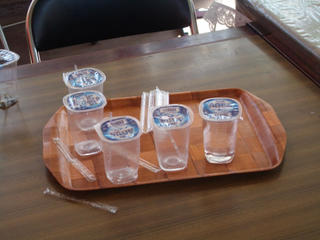 Serious crimes against the environment series #134
Serious crimes against the environment series #134
